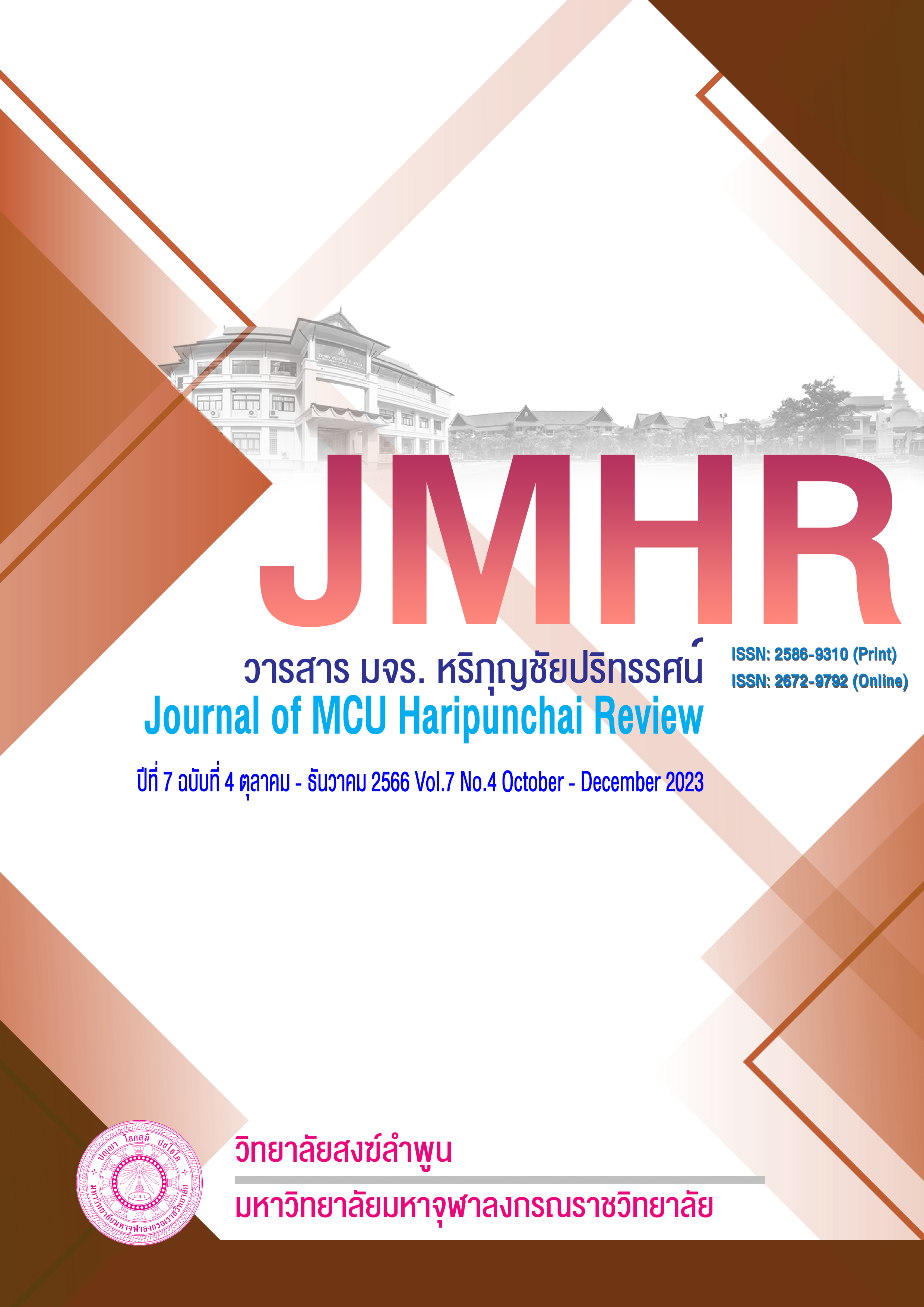Integrated Buddhist Method for Creating Political Reconciliation in Thailand
Main Article Content
Abstract
This research was qualitative research by documentary research using focus group interviews with important target groups. There were 30 people in total. The results showed that: The concept of politics and government in Buddhism is of 3 principles of sovereignty namely: 1) Attàdhipateyya is government that uses one's own authority, 2) Lokàdhipateyya is government that uses the supreme authority based on the opinions of the majority, and 3) Dhammàdhipateyya is a rule based on righteousness. Problems and political reconciliation process in Thailand Political conflicts are widespread, violations of the rule of law, serious violations of the principles of democracy. The national reconciliation process under this atmosphere of widespread ideological divisions must be activated by dialogue process at two levels: 1) the level of political representatives and direct stakeholder groups, and 2) the level of people in the area in the form of the Thai forum. The integrated Buddhist way of creating reconciliation in Thai politics is to apply the principles of Sãrãnĩyadhamma to create reconciliation: 1) In creating conflicts and violence physically, verbally, and mentally,coup d'etat, slander, the principles of Mettākāyakamma, Mettāvacākamma, and Mettāmanokamma are in need. 2) On selfishness. Corruption, the Sādhārañabhogitā is in need. 3) In the unfair treatment, injustice, unfair use of power, the Sĩlasāmaññatā, is in need. 4) On the different opinions, creating divisions of thought, the Ditthisāmaññatā is in need. The creation of harmonious atmosphere is the prerequisite, the precondition for building a path to harmony and the peaceful society.
Article Details

This work is licensed under a Creative Commons Attribution-NonCommercial-NoDerivatives 4.0 International License.
References
ประพัฒน์ ปัญญาชาติรักษ์. (2553). “การศึกษาวิเคราะห์การเมืองการปกครองในคัมภีร์พระพุทธศาสนา”. วิทยานิพนธ์พุทธศาสตรมหาบัณฑิต. บัณฑิตวิทยาลัย : มหาวิทยาลัยมหาจุฬาลงกรณราชวิทยาลัย.
ประเวศ วะสี, (2540). ปฏิรูปการเมือง. กรุงเทพมหานคร : สำนักพิมพ์หมอชาวบ้าน.
พระพรหมคุณาภรณ์ (ป.อ.ปยุตโต). (2541). พจนานุกรมพุทธศาสตร์ ฉบับประมวลธรรม, พิมพ์ครั้งที่ 16. กรุงเทพมหานคร : บริษัท เอส. อาร์. พริ้นติ้ง แมส โปรดักชั่น จำกัด.
พระมหากฤตวิทย์ อธิฏฺฐาโน (สนธิสุข). (2548). “ศึกษาเปรียบเทียบแนวความคิดประชาธิปไตยในพุทธปรัชญาเถรวาทกับแนวคิดประชาธิปไตยในสังคมปัจจุบัน”. วิทยานิพนธ์นิพนธ์พุทธศาสตรมหาบัณฑิต (ปรัชญา). บัณฑิตวิทยาลัย : มหาวิทยาลัยมหาจุฬาลงกรณราชวิทยาลัย.
พระมหาไพรัชน์ ธมฺมทีโป และคณะ. (2560). “กัลยาณมิตรในพระพุทธศาสนากับปรัชญา ตะวันตก : บูรณาการเพื่อความสมานฉันท์ในสังคมไทย”. วารสารบัณฑิตศึกษาปริทรรศน์. ปีที่ 13ฉบับที่ 2 (พฤษภาคม-สิงหาคม) : 54-69.
พระสานนท์ จรณธมฺโม (เตี้ยนวน). (2549). “การศึกษาเชิงวิเคราะห์เปรียบเทียบแนวความคิดทางการเมืองของเพลโตกับของพระพรหมคุณาภรณ์ (ป.อ.ปยุตโต)”. วิทยานิพนธ์พุทธศาสตรมหาบัณฑิต. บัณฑิตวิทยาลัย : มหาวิทยาลัยมหาจุฬาลงกรณราชวิทยาลัย.
พอพล มณีรินทร์. (2539). “การปฏิรูปการเลือกตั้ง : ศึกษาเปรียบเทียบแนวความคิดนักการเมืองและข้าราชการประจำ”. วิทยานิพนธ์รัฐศาสตรมหาบัณฑิต. บัณฑิตวิทยาลัย : จุฬาลงกรณ์มหาวิทยาลัย.
พุทธทาสภิกขุ. (2549). ธรรมะกับการเมือง. พิมพ์ครั้งที่ 3. กรุงเทพมหานคร : สำนักพิมพ์สุขภาพใจ.
มหาจุฬาลงกรณราชวิทยาลัย. (2539). พระไตรปิฎกภาษาไทย ฉบับมหาจุฬาลงกรณราชวิทยาลัย. กรุงเทพมหานคร: โรงพิมพ์มหาจุฬาลงกรณราชวิทยาลัย.
วรเจตน์ ภาคีรัตน์. (2557). คำสอนว่าด้วยรัฐและหลักกฎหมายมหาชน. พิมพ์ครั้งที่ 2. กรุงเทพมหานคร : โรงพิมพ์เดือนตุลา.
สมศักดิ์ เนียมเล็ก. (2544). “วิเคราะห์ความคิดทางการเมืองของท่านพุทธทาสภิกขุ”. วิทยานิพนธ์ศิลปศาสตรมหาบัณฑิต. บัณฑิตวิทยาลัย : มหาวิทยาลัยรามคำแหง.
สมาคมนักเรียนทุนรัฐบาลไทย. (2541). การเมือง การปกครองและกฎหมาย. กรุงเทพมหานคร : สมาคมนักเรียนทุนรัฐบาลไทย.
สุดารัตน์ เกยุราพันธุ์. คุณหญิง. (2545). “พุทธวิธีเชิงบูรณาการแก้ปัญหาความขัดแย้งในการเมืองไทยปัจจุบัน”. วิทยานิพนธ์นิพนธ์พุทธศาสตรดุษฎีบัณฑิต. บัณฑิตวิทยาลัย : มหาวิทยาลัยมหาจุฬาลงกรณราชวิทยาลัย.


